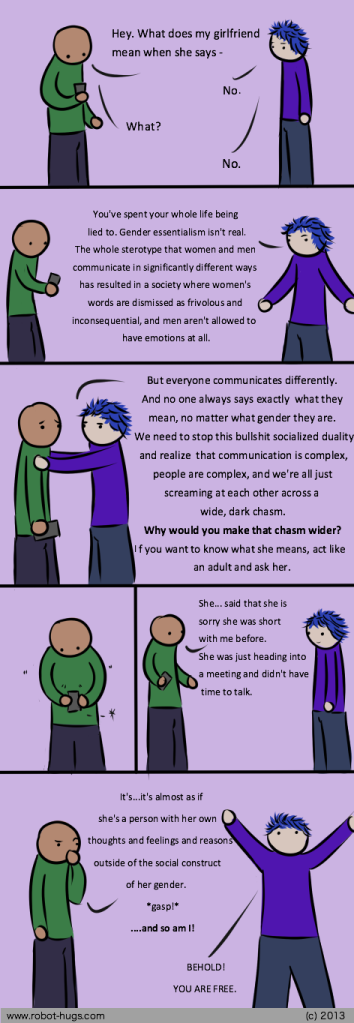Breaking News: October 16th has been declared Janelle Monáe Day by the Boston City Council! They chose to honor Electric Lady #1 for speaking up for the oppressed. Great to see a fellow feminist get such deserved recognition! Learn more about her here.
Monthly Archives: October 2013
Janelle Monáe – “My Message is to Rebel Against Sexism”
Janelle Monáe the R&B and soul musician, composer and recorder producer is performing tonight (Wednesday October 16th) at the House of Blues here in Boston. Tickets still available Here.
An advocate of female empowerment, Monáe talks in this interview about her message:
Songs Include: Tightrope (ft. Big Boi), Prime Time (ft. Miguel) Dance Apocalyptic, Q.U.E.E.N (ft. Erykah Badu), and Cold War
UPDATE: We are the first to report that October 16th has been declared Janelle Monáe Day by the Boston City Council! They chose to honor Electric Lady #1 for speaking up for the oppressed. More details will follow soon!
Who’s Issue
“Rape is not a women’s issue, or a humanitarian issue, it is a global issue.” – Angelina Jolie attending the G8 Foreign Ministers meeting
I Need Feminism Because…
The ARU Feminist Society and CUSU Women’s Campaign worked together to ask students at Cambridge University why they need feminism. Sure it’s a different Cambridge than the one close to BU, but the reasons still apply. Take a click through to see around 700 signs saying why feminism is needed.

DFM? #2: Laurel!
Even though she was in a hurry to get where she was going, this undergrad stopped to talk with us in front of 685 Comm Ave when we asked if she could answer our few questions. We thank her for her good will.
 DFM #2
DFM #2
Tuesday, October 15, 2013 (we took Indigenous People’s Day off)
Hi! What’s your name?
Laurel
Where ya from?
California!
What are you studying, what do you do?
Film and Television!
Tell us: Does feminism Matter?
“Yes… [hesitates]… it’s a complex subject to talk about but I would definitely say yes, it does matter.”
One a scale of 1-10, how much do you think feminism matters?
8
Sexual Fluidity in Women

In certain circles I have found myself in recently, I have felt a pressure to be so self-aware and self-reflective at such a young age that it seems as though you have to fully know your entire sexuality. While the individuals in these circles certainly recognize sexual fluidity in an academic sense, sexual fluidity in the practical application comes across as naiveté and even ignorant. I have noticed a pressure to define the self –“I’m trans*, I’m pansexual, I’m gay”–granted, there are more boxes to fit into, but a box nonetheless. The vulnerability that accompanies sexual fluidity is real and frightening, and it is not readily acceptable to say “I’m still figuring it out” in regards to your sexuality even among enlightened, educated, seemingly-accepting groups.
Seeing homosexuality as a “phase” is an opinion that has bothered me in the past, but an analysis entitled “Gender Differences in Erotic Plasticity: The Female Sex Drive as Socially Flexible and Responsive” by Roy Baumeister may have transformed my thinking. Although it does trivialize and insult the experiences of lifelong lesbians, the “just a phase” notion may have some value. The concept of sexual plasticity indirectly endorses the idea of lesbianism as a phase, but instead of thinking of it as one singular phase, we should think in a more pluralistic sense that our sexualities consist of multiple, intertwined phases.
Ideally, we could restructure our understanding of female sexuality so there is less pressure to define the self and cramp our fascinating, complex, surprising sexualities into little boxes. The concept of bisexuality, especially in regards to long-term relationships, leads to an interesting question. Is bisexuality a phase? It is rare to encounter an individual who identifies as bisexual and who has been in a monogamous relationship for several years or even decades. At what point does a bisexual woman start identifying themselves as gay or straight, depending on their chosen partner? It has been suggested that female erotic plasticity evolved as an evolutionary adaptation. Sexual fluidity is advantageous through periods of life transition such as a romantic separation, having a child, the death of a partner, getting a new job, or general aging, and can help women adjust their sexual needs and expectations depending upon circumstances. A study indicated that from puberty onward, men tend to keep their rate of orgasms relatively constant throughout the lifespan, either through masturbation or partnered sex, while women’s frequency of orgasms tends to reflect her fluctuating sexual desire and expectations and thus erotic plasticity.
Sexual fluidity is even displayed in popular television such as Orange Is the New Black, which is based on the story of Piper Kerman, a middle-class woman sentenced to prison after transporting drug money. In prison, Piper reunites with her drug-dealing girlfriend, despite being affianced to her male partner, out of sheer desperation for human contact and warmth. Piper’s return to lesbianism because of her situation may be termed “gay behind bars”, but other new language has been created to reflect women’s sexual flexibility. Words such as “has-bian”, “heteroflexibility”, and “LUG–lesbian until graduation” are all coming into our current vernacular. A term I heard recently used in relation to a man, but could also be applied to women, is “GIFFY,” meaning “gay in five (fucking) years”. This acronym can be used to describe an individual who identifies as straight but acts otherwise, who the speaker believes will finally come out years later. This language may be seen as degrading or useful. While it only perpetuates stereotypes, reinforces the idea that timing is intimately tied to lesbianism, and forces people into boxes, this language is frequently created and used by the queer community.
Editors’ suggestions for additional reading:
- Sexual Fluidity: Understanding Women’s Love and Desire by Lisa M. Diamond
- Orange is the New Black: My Year in a Women’s Prison by Piper Kerman
- Evolution’s Rainbow: Diversity, Gender, and Sexuality in Nature and People by Joan Roughgarden
Pope Francis Picked a Peck of Pickled Peppers
His Holiness spoke out against the role of women in the Church shifting from one of “service” to one of “servitude”, as reported on Globalpost. For this, we commend the Holy Father.
However, in elaborating his point, the Supreme Pastor (a man of many names – seriously, check them out here) went on to make some points which are worth questioning:
The “sort of emancipation” that allows women to enter traditionally male domains may rob them of “the very femininity that characterizes them”.
…
Whatever cultural and social changes have occurred or may occur, “the fact remains that it is the woman who conceives, carries and brings into the world the children of men,” the pontiff said.
While his aim was to highlight the importance of women in society, this may not quite be the right approach, because:
- His claims are essentialist. ‘Essentialism‘ means believing that a woman is somehow truly, deep in her core, identifiable as a woman; being a woman is not simply the result of different attributes and behavior. (as described in this other Hoochie post).
The debates over essentialism rage on. Whether the Pope’s viewpoint is supported by evidence is one question; yet another is whether we should criticize the Church for its views… are the women in question not there of their own will?
I don’t know what is right – but it’s worth asking the question.
What do you think – how do feminist ideas fit in with the Catholic Church?
Related articles
- “Service, Yes – Servitude, No!”: “Woman’s Day,” Francis Edition (whispersintheloggia.blogspot.com)
- Pope says ‘service not servitude’ should be role of women in Catholic Church (dnaindia.com)
- What Pope Francis Thinks About Women in the Church (ideas.time.com)
- Pope stresses ‘service’ role for women in Catholic Church (nation.co.ke)
- “It pleases me to think that the Church is a she, not an it”: Pope Francis speaks on the nature and vocation of women… (en.radiovaticana.va)
DFM? #1: Ellen!
Introducing a new Hoochie project! “DFM” stands for “Does Feminism Matter?”. Of course you know our answer — we’re all friendly fierce fine feminists here, eh? If that’s surprising, you should have read the sign on the door — but another question that matters is, “Do other people in our community think feminism matters?” So we’re gathering some data.
Our staff writers are going to be prowling the streets around the BU campus, stopping passersby each day to put an all-important question to them: “Does Feminism Matter?” We’ll post their responses here, without editorialization, so as to help create an accurate portrayal of the state of feminist attitudes and awareness in our community.
Here to kick off the series is an undergrad we found sunning herself on the steps of the Tsai Center.
 DFM #1
DFM #1
Friday, October 11, 2013
Hi! What’s your name?
Ellen
Where ya from?
Albany!
What are you studying, what do you do?
Chinese and French!
Tell us: Does feminism Matter?
“I think so, yes! Men and woman matter equally, so the study of men and women as a whole matters.”
One a scale of 1-10, how much do you think feminism matters? 10
Slam Poetry: “Sons”
“Sons” – Teresa Siagatonu and Rudy Francisco performing for Hollywood’s Da Poetry Lounge during semifinals at 2013 National Poetry Slam. DPL ended up taking 2nd in the tournament (from the YouTube description)

